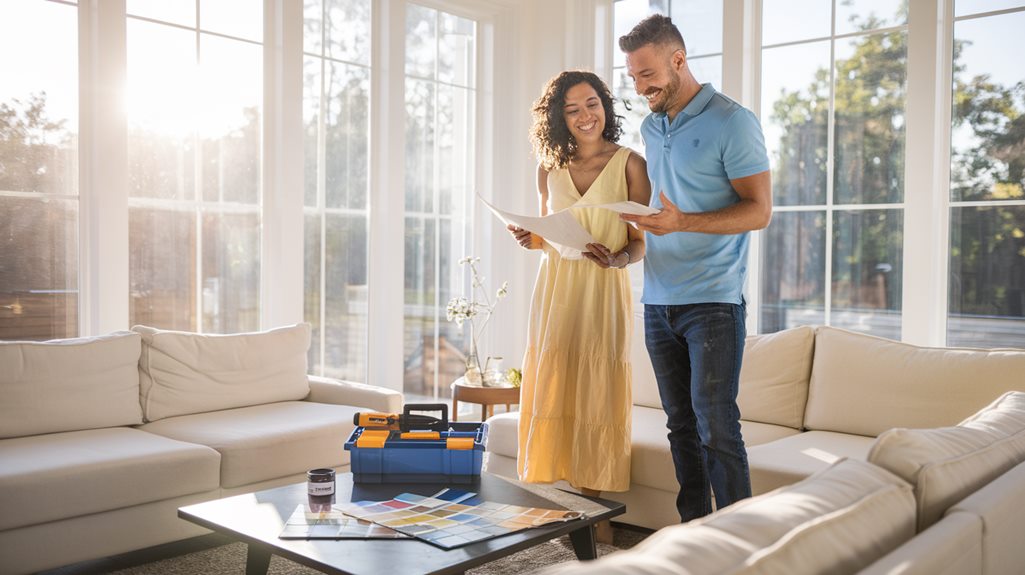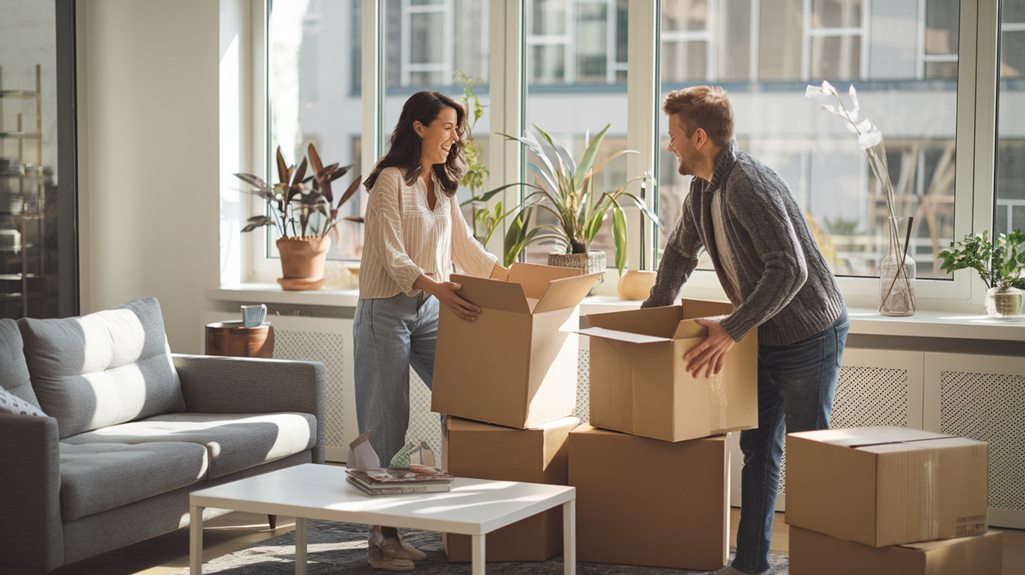Congratulations on becoming a new homeowner! Here are some helpful tips to make your new journey easier and more fun.
First, think about keeping your home safe. You can do this by getting strong locks and joining neighborhood watch groups.
Next, learn some basic home repairs. This way, you will feel more confident fixing things when they break.
It's also important to make a budget. This helps you keep track of your mortgage, bills, and any surprise costs that might come up.
Make friends in your neighborhood, too! This will help you feel more at home and discover fun places nearby.
Keep your important papers organized. This will help you find what you need without getting stressed.
You can also make your home special by adding your own style and comfort to it.
Lastly, think about ways to improve your home in the future. This can make your home more valuable and efficient.
Following these tips will not only make your life as a homeowner better, but it will also help you learn more about taking care of your home!
Ready to start building equity in your own Michigan home? Get your personalized home loan quote today.
Prioritize Home Security

Keeping your home safe is super important, especially if you're a new homeowner. First, think about getting strong security systems and cameras. They help keep bad people away.
You can also join a neighborhood watch program. This way, you and your neighbors can help each other stay safe.
Make sure your yard is bright by adding lights. This will get rid of dark spots where someone could hide. You can use smart devices too. They let you see what's happening at your home and control things from your phone.
Check your home insurance to make sure it protects you from break-ins. It's smart to have a list of emergency contacts in a place where you can find it easily.
Don't forget about fire safety! Put smoke detectors in your home and keep fire extinguishers nearby.
You might be closer to buying your home than you think
Take our 2-minute home buyer readiness quiz to see how prepared you really are – no credit check required.

Michigan residents, unlock the door to your new home. Request your home loan quote from Treeside Financial today.
Understand Maintenance Basics
If you're a new homeowner, it's really important to learn some basic maintenance skills. This will help keep your home nice and safe.
Start by getting to know some useful tools. Also, try to check your home often to find any problems early.
Things like dripping faucets or bad wires can be fixed easily if you catch them in time. This way, you can avoid big and expensive repairs later on.
Learn Essential Tools
Having a home means you'll have to do some repairs. To do this well, you need the right tools. Start with a small toolkit that has a hammer, screwdrivers, pliers, and a tape measure. These tools will help you fix things easily and make you feel proud and capable. You might also want a cordless drill to help with many jobs.
It's important to keep your tools in order. You can use a toolbox or a pegboard to store them. This way, you won't waste time looking for what you need.
Taking care of your home can be a fun adventure, and having the right tools helps you do it better. It can also make you feel like you belong and have done something great in your community.
Schedule Regular Inspections
Taking care of your home is important! It's not just about having the right tools; it's also about keeping an eye on things.
Scheduling regular check-ups for your home is a smart way to prevent problems before they get big and expensive. By looking at your home every season, you can find little issues that can be fixed easily. This not only saves you money but also helps make your neighborhood nice and tidy.
Try to check important parts of your home, like the roof, heating and cooling system, and pipes, at least two times a year. You can also ask experts to help you. They know what to look for and can make sure everything is okay.
Identify Common Issues
Keeping your home happy and healthy is important. Look for problems before they get worse. Check for plumbing issues like leaks or slow drains. These can cause big problems later.
Watch for electrical issues, like lights that flicker. They might mean something is wrong.
Look at your home's foundation and roof for cracks or leaks. These can hurt your house. If you see pests, like bugs or mice, take care of them quickly to avoid damage.
Make sure your heating and cooling system is working well. This helps keep your home comfortable. Check your insulation, too. Good insulation can help save money on energy bills.
Keep an eye out for mold, which can make the air inside your home unhealthy. Pay attention to your appliances. If they stop working, fix them fast.
Also, take care of your yard to make it look nice.
Set a Realistic Budget

When you make a budget for your new home, it's important to think about the things you really need to pay for, like your mortgage and utility bills. This helps you stay on top of your money.
Also, remember that sometimes things can go wrong, like needing repairs or facing emergencies. It's smart to save some money for these surprises.
If you plan well, you can enjoy your new home and keep your money safe too!
Prioritize Necessary Expenses
Making a budget is very important for new homeowners. It helps you keep track of your money.
First, think about the things you really need to pay for, like your house payment, electricity, and fixing things around the house. It's also a good idea to save some money for emergencies. This way, if something surprises you, like a big bill, you'll be okay.
Take a look at how you spend your money. You can save money by using things like energy-efficient appliances or checking if you can get a better deal on your mortgage.
This careful plan helps you not to worry about money and lets you enjoy your new home and neighborhood.
Plan For Unexpected Costs
When you buy a house, it's super important to plan for surprises. You never know when something might break or when you might've to pay more taxes. That's why it's a good idea to save some money just for these unexpected costs. This money is called an emergency fund.
To start saving, look at what you spend each month. Can you find ways to save a little? Maybe you can put aside a small part of your paycheck every week or month.
Having this extra money will help you feel safe and happy in your new home. It's always better to be ready for surprises than to be caught off guard.
Get to Know Your Neighborhood
Exploring your new neighborhood is like opening a door to new friends and fun. Start by checking out local parks, libraries, and shops.
These places are important because they help you feel at home and make life easier. They're where people in the community come together.
Go to local events like farmers' markets or festivals. These are great times to meet your neighbors and make new friends.
By joining in, you'll learn more about your neighborhood and feel like you belong.
Enjoy this adventure! Soon, your new neighborhood will feel just like a big family.
Organize Important Documents

When you buy a new home, it's super important to keep your important papers safe and organized. You can use a strong filing cabinet or make a special folder on your computer. This way, you'll always know where to find your papers!
Start by sorting your documents into different groups. Here's a simple chart to help you:
| Group | Examples | Tips for Keeping Them Safe |
|---|---|---|
| Home Purchase | Deed, mortgage papers | Save them on your computer and in a file |
| Utilities | Bills, service contracts | Keep them in order by date |
| Insurance | Home, health, life plans | Always have updated copies |
| Maintenance | Repair receipts, warranties | Use labeled folders to find them easily |
| Personal Records | Birth certificates, passports | Keep them in a safe place or on the cloud |
Organizing your documents helps you feel at home and keeps things running smoothly. When you know where everything is, it makes life a little easier and less stressful!
Personalize Your Space
Making your new house feel like home is all about adding things that show who you are. Start by picking colors that you love. This helps make your rooms feel cozy and welcoming.
Hang up pictures or art that tell your story and show what you like. Arrange your furniture so friends and family can sit together and chat comfortably.
Put up special items that remind you of fun times or people you care about. To keep everything looking nice, think about a theme for each room that fits your life.
Use different lights to make some areas bright and others soft and comfy. Don't forget about the outside! You can decorate there, too, to show off your style.
Lastly, change things up a bit with the seasons. Adding new decorations can keep your home feeling fresh and connected to nature.
Let your home be a true reflection of you!
Plan for Future Improvements

Making plans for the future is important to keep your new home special and valuable. By thinking about these changes, you help your home last longer and make your neighborhood better, too.
First, you can think about ways to save energy. This can help you pay less on your bills and be kinder to the Earth. You could use smart thermostats or get new windows that keep the heat in.
Next, let's talk about how to make your yard look nice. You can pick plants that grow well in your area and don't need a lot of care or water. This will make your home look great from the outside.
Finally, think about some big changes you want to make in your home. Maybe you want a new kitchen or bathroom that fits your dreams.
- Energy-Saving Ideas: Put solar panels on your roof or buy energy-saving appliances.
- Yard Ideas: Create fun spaces outside for family and friends.
- Home Changes: Update your kitchen or bathroom to make them better.
These changes can help you feel happy in your neighborhood!








